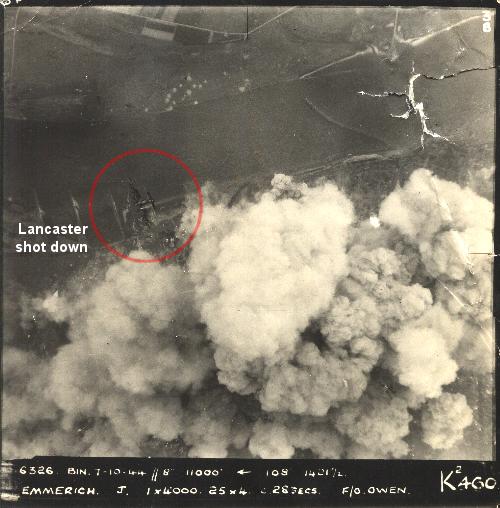
6326 BIN 7-10-44 // 8" 11000 <- 108 1421 1/2
EMMERICH J. 1x4000 25x4 C. 28 secs. F/O Owen K2 460

Emmerich, 7th October 1945, 14:01 1/2 hours, 17,250 feet.
Log book states – Bomb load: 1 x 4,000 pounder, 6 x 750 cluster, 6x 500 cluster, 2 SBC 60 x 4. An escort of 21 Squadron Spitfires and 7 Squadron Mustangs.
A description of the raid as appearing in the Bomber Command War Diaries, M. Middlebrook, C. Everitt:
"340 Lancasters and 10 Mosquitos of 1, 3 and 8 Groups carried out an even more accurate attack on Emmerich. 3 Lancasters were lost. A local report says that 2,424 buildings in the town were destroyed and 689 damaged, with 680,000 cubic meters of rubble having to be cleared away after the raid. 641 German civilians and 96 soldiers were killed."
Excerpt from "Flying into the Mouth of Hell", Laurie Woods :–
Following the parachuting of the British Parachute Regiment known as the "red devils" into the Arnhem Gap Bomber Command was detailed on 7 October to attack five nearby targets where the supplies were getting through to the German forces.
On a Saturday afternoon Flying in K2 "Killer" in a force of 340 Lancasters and 10 Mosquitos of 1, 3, & 8 Groups we carried out a very successful raid, on Emmerich an important road and rail centre, on the Rhine River.
From a maximum effort on this raid 460 Squadron out of the 31 Lancasters sent, lost only one commanded by Flight/Lieutenant Eric. R. Greenacre, DFC. who was on the fourth trip of his second tour, having completed his first tour on 460 Squadron in 1943. He was quite a long way south of the target when they were hit.
We saw only five parachutes blossom, just before the plane nose dived to the ground. The Germans took the crew members prisoner. When released Eric Greenacre and a few others had difficulty in getting back to England. They stole a small keg of rum and used it to bribe truck drivers to give them a lift to the coast. The trucks were ferrying supplies from the French coast for the Allies. The English engineer George Cairns became a Wing Commander in the post war RAF.
Flying /Officer D.K.Gratton in PB254 AR–K was hit by incendiaries over the target causing a serious fire in the Wireless/Operator's compartment. Gratton gave the order to bale out, and three baled out.
The Wireless/Operator grabbed the incendiary in his jacket and threw it out down the photo flash tube, and managed to put the fire out. On their return to England Gratton made a crash landing at Hawkinge in Kent.
From reports on the squadron after the raid some of the crew members who baled out were shot by ground fire as they came down on their parachutes. The navigator W/O K.G.Potter, from Hobart, died in the descent.
We were well aware of Dr Goebbels and his propaganda about the "Terrorfliegers" the term he used in his broadcasts in describing the bomber command aircrews and of the damage they were doing to his beloved "Fatherland". Of course it was easy to forget the damage the German aircrews had done to English cities, London, Coventry, York, Hull, Bournemouth, Brighton, etc.